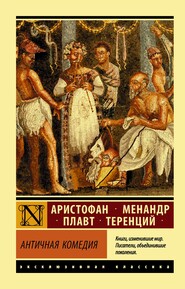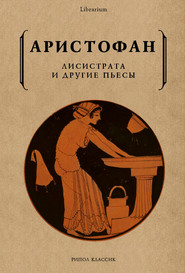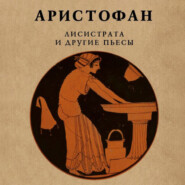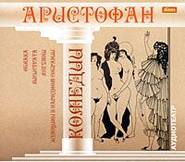По всем вопросам обращайтесь на: info@litportal.ru
(©) 2003-2024.
✖
The Eleven Comedies, Volume 1
Автор
Год написания книги
2018
Настройки чтения
Размер шрифта
Высота строк
Поля
283
Brasidas perished in Thrace in the same battle as Cleon at Amphipolis, 422 B.C.
284
An Athenian general as ambitious as he was brave. In 423 B.C. he had failed in an enterprise against Heraclea, a storm having destroyed his fleet. Since then he had distinguished himself in several actions, and was destined, some years later, to share the command of the expedition to Sicily with Alcibiades and Nicias.
285
Meaning, to start on a military expedition.
286
Cleon.
287
The Chorus insist on the conventional choric dance.
288
One of the most favourite games with the Greeks. A stick was set upright in the ground and to this the beam of a balance was attached by its centre. Two vessels were hung from the extremities of the beam so as to balance; beneath these two other and larger dishes were placed and filled with water, and in the middle of each a brazen figure, called Manes, was stood. The game consisted in throwing drops of wine from an agreed distance into one or the other vessel, so that, dragged downwards by the weight of the liquor, it bumped against Manes.
289
A general of austere habits; he disposed of all his property to pay the cost of a naval expedition, in which he beat the fleet of the foe off the promontory of Rhium in 429 B.C.
290
The Lyceum was a portico ornamented with paintings and surrounded with gardens, in which military exercises took place.
291
A citizen of Miletus, who betrayed his country to the people of Priené. When asked what he purposed, he replied, "Nothing bad," which expression had therefore passed into a proverb.
292
Hermes was the god of chance.
293
As the soldiers had to do when starting on an expedition.
294
That is, you are pedicated.
295
The initiated were thought to enjoy greater happiness after death.
296
He summons Zeus to reveal Trygaeus' conspiracy.
297
An Athenian captain, who later had the recall of Alcibiades decreed by the Athenian people; in 'The Birds' Aristophanes represents him as a cowardly braggart. He was the reactionary leader who established the Oligarchical Government of the Four Hundred, 411 B.C., after the failure of the Syracusan expedition.
298
Among other attributes, Hermes was the god of thieves.
299
Alluding to the eclipses of the sun and the moon.
300
The Panathenaea were dedicated to Athené, the Mysteries to Demeter, the Dipolia to Zeus, the Adonia to Aphrodité and Adonis. Trygaeus promises Hermes that he shall be worshipped in the place of all the other gods.
301
The pun here cannot be kept. The word [Greek: paian], Paean, resembles [Greek: paiein], to strike; hence the word, as recalling the blows and wounds of the war, seems of ill omen to Trygaeus.
302
The device on his shield was a Gorgon's head. (See 'The Acharnians.')
303
Both Sparta and Athens had sought the alliance of the Argives; they had kept themselves strictly neutral and had received pay from both sides. But, the year after the production of 'The Wasps,' they openly joined Athens, had attacked Epidaurus and got cut to pieces by the Spartans.
304
These are the Spartan prisoners from Sphacteria, who were lying in gaol at Athens. They were chained fast to large beams of wood.
305
'Twas want of force, not want of will. They had suffered more than any other people from the war. (See 'The Acharnians.')
306
Meaning, look chiefly to your fleet. This was the counsel that Themistocles frequently gave the Athenians.
307
A metaphor referring to the abundant vintages that peace would assure.











